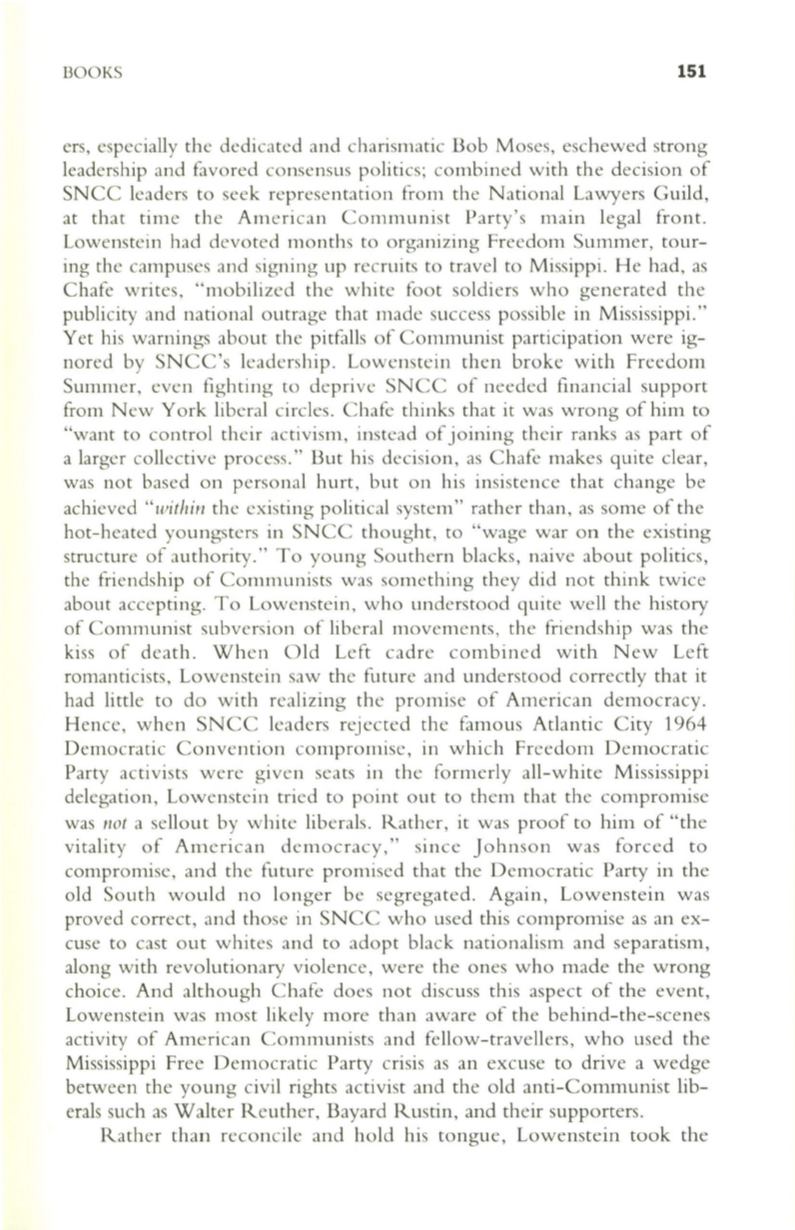
BOOKS
151
ers, especially the dedicated and charismatic Bob Moses, eschewed strong
leadership and favored consensus politics; combined with the decision of
SNCC leaders to seek representation from the National Lawyers Guild,
at that time the American Communist Party's main legal front.
Lowenstein had devoted months to organizing Freedom Summer, tour–
ing the campuses and signing up recruits to travel to Missippi. He had, as
Chafe writes, "mobilized the white foot soldiers who generated the
publicity and national outrage that made success possible in Mississippi."
Yet his warnings about the pitfalls of Communist participation were ig–
nored by SNCC's leadership. Lowenstein then broke with Freedom
Summer, even fighting to deprive SNCC of needed financial support
from New York liberal circles. Chafe thinks that it was wrong of him to
"want
to
control their activism, instead of joining their ranks as part of
a larger collective process." But his decision, as Chafe makes quite clear,
was not based on personal hurt, but on his insistence that change be
achieved
"within
the existing political system" rather than, as some of the
hot-heated youngsters in SNCC thought, to "wage war on the existing
structure of authority." To young Southern blacks, naive about politics,
the friendship of Communists was something they did not think twice
about accepting. To Lowenstein, who understood quite well the history
of Communist subversion of liberal movements, the friendship was the
kiss of death. When Old Left cadre combined with New Left
romanticists, Lowenstein saw the future and understood correctly that it
had little to do with realizing the promise of American democracy.
Hence, when SNCC leaders rejected the famous Atlantic City 1964
Democratic Convention compromise, in which Freedom Democratic
Party activists were given seats in the formerly all-white Mississippi
delegation, Lowenstein tried to point out to them that the compromise
was
not
a sellout by white liberals. Rather, it was proof to him of "the
vitality of American democracy," since Johnson was forced to
compromise, and the future promised that the Democratic Party in the
old South would no longer be segregated. Again, Lowenstein was
proved correct, and those in SNCC who used this compromise as an ex–
cuse to cast out whites and to adopt black nationalism and separatism,
along with revolutionary violence, were the ones who made the wrong
choice. And although Chafe does not discuss this aspect of the event,
Lowenstein was most likely more than aware of the behind-the-scenes
activity of American Communists and fellow-travellers, who used the
Mississippi Free Democratic Party crisis as an excuse to drive a wedge
between the young civil rights activist and the old anti-Communist lib–
erals such as Walter Reuther, Bayard Rustin, and their supporters.
Rather than reconcile and hold his tongue, Lowenstein took the


